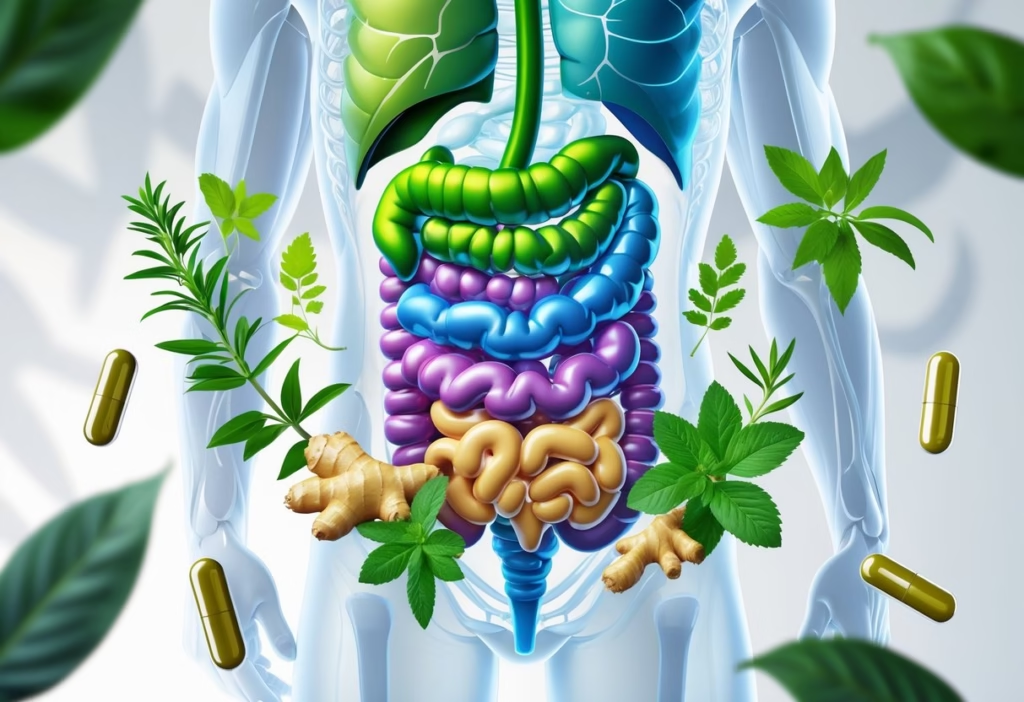Digestive Supplements
Digestive Supplements: Natural Support for a Balanced Gut and Fresher Life
Your digestive system affects far more than just how you feel after meals. A healthy gut influences your immune system, energy levels, mood, and overall well-being. When digestive balance gets disrupted by stress, processed foods, or medications, many people experience bloating, fatigue, and discomfort that impacts their daily life.

Natural digestive supplements can help restore gut balance by supporting beneficial bacteria, improving nutrient absorption, and addressing common digestive concerns. Research shows that gut health supplements are becoming increasingly popular as people discover how much the digestive system affects the rest of the body. These supplements work alongside the body’s natural processes to promote better digestion and a healthier microbiome.
Understanding which supplements work best requires knowing how different ingredients support gut health. From probiotics that introduce beneficial bacteria to digestive enzymes that help break down food, each type of supplement serves a specific purpose. The right combination of natural ingredients, paired with supportive lifestyle choices, can help people achieve better digestive wellness and feel more energized throughout the day.
How Digestive Supplements Promote a Balanced Gut

Digestive supplements work by restoring beneficial bacteria, improving nutrient breakdown, and strengthening the gut barrier. These supplements directly support immune function through the gut-immune connection, which controls inflammation and disease resistance throughout the body.
Role of Gut Health in Overall Wellness
The digestive tract houses trillions of bacteria that influence many body functions beyond digestion. A healthy gut microbiome affects mood, energy levels, and disease prevention.
Gut health significantly influences overall well-being, impacting digestion, immunity, and even mental health. The gut produces neurotransmitters like serotonin, which regulate mood and sleep patterns.
When gut bacteria are balanced, they produce short-chain fatty acids like butyrate. These compounds reduce inflammation throughout the body and support brain health.
An imbalanced gut can lead to digestive issues, frequent infections, and chronic fatigue. Harmful bacteria can overgrow and release toxins that enter the bloodstream.
Digestive supplements help restore this balance by introducing beneficial bacteria and providing nutrients that support gut barrier function. This creates a foundation for better overall health and disease prevention.
Impact on Digestion and Nutrient Absorption
Proper digestion requires enzymes, acid, and beneficial bacteria working together to break down food. When any component is missing, nutrient absorption suffers.
Digestive enzymes help break down proteins, fats, and carbohydrates into smaller molecules the body can absorb. People with enzyme deficiencies often experience bloating, gas, and poor nutrient status.
Probiotics improve digestion by producing enzymes and maintaining proper pH levels in the intestines. They also help break down fiber into beneficial compounds that feed other good bacteria.
A damaged gut lining allows undigested food particles to enter the bloodstream, causing inflammation and nutrient malabsorption. This condition is called leaky gut syndrome.
L-glutamine and collagen supplements help repair the intestinal lining and improve nutrient absorption. These amino acids provide building blocks for gut barrier cells.
Fiber supplements feed beneficial bacteria, which then produce vitamins like B12 and vitamin K. This symbiotic relationship ensures the body gets essential nutrients from both food and bacterial production.
Connection Between Gut and Immune System
The gut contains about 70% of the body’s immune cells, making it the largest immune organ. This system constantly monitors incoming substances and decides whether they are helpful or harmful.
Beneficial bacteria train immune cells to recognize real threats while ignoring harmless substances like food proteins. This prevents unnecessary immune reactions and autoimmune conditions.
When gut bacteria are imbalanced, immune function becomes compromised. Harmful bacteria can trigger chronic inflammation and weaken the body’s ability to fight infections.
Probiotics help modulate the gut-immune connection and reduce gut inflammation. Specific strains like Lactobacillus and Bifidobacterium strengthen immune responses against pathogens.
The gut barrier acts as a physical defense, preventing harmful substances from entering the bloodstream. Supplements like zinc and vitamin C support this barrier function and immune health.
A healthy gut also produces antimicrobial compounds that fight off disease-causing bacteria and viruses. This natural defense system works alongside the immune system to maintain health.
Understanding the Gut Microbiome and Its Importance

The gut microbiome contains trillions of microorganisms that work together to support digestion, immune function, and overall health. These bacteria, viruses, and fungi create a protective barrier in the intestines while producing essential compounds that benefit the entire body.
Composition and Functions of Gut Microbiota
The gut microbiome consists of trillions of microorganisms living in the digestive tract. This complex ecosystem includes bacteria, viruses, fungi, and parasites that work together.
Key bacterial groups include:
- Bifidobacterium species
- Lactobacillus strains
- Faecalibacterium prausnitzii
- Bacteroides varieties
The gut microbiota performs several critical functions. It breaks down food particles that human enzymes cannot digest. These microorganisms produce short-chain fatty acids like acetate, propionate, and butyrate.
Primary functions include:
- Nutrient production and absorption
- Immune system regulation
- Inflammation control
- Hormone production support
Good bacteria also compete with harmful microorganisms for space and nutrients. This competition helps prevent dangerous bacteria from taking over the gut environment.
The microbiome changes throughout a person’s life. Diet, stress, medications, and illness all affect which bacteria thrive in the intestines.
Maintaining Good Bacteria Balance
A balanced gut microbiota requires the right mix of beneficial bacteria species. When good bacteria outnumber harmful ones, the digestive system functions properly.
Factors that support good bacteria:
- Fiber-rich foods
- Fermented products
- Prebiotic supplements
- Regular sleep patterns
- Stress management
Factors that harm beneficial bacteria:
- Antibiotics
- Processed foods
- High sugar intake
- Chronic stress
- Lack of sleep
Prebiotics help maintain bacterial balance by feeding beneficial microorganisms. These special fibers pass through the small intestine undigested and reach the colon where good bacteria ferment them.
Probiotics introduce live beneficial bacteria directly into the gut. These supplements can help restore balance after antibiotic treatment or illness.
The ratio between different bacterial species matters more than total numbers. A diverse microbiome with many different beneficial species typically indicates better gut health than one dominated by just a few types.
Gut Barrier and Lining Protection
The gut barrier consists of a single layer of cells that line the intestinal wall. This barrier controls what passes from the digestive tract into the bloodstream.
Good bacteria strengthen the gut lining by producing protective compounds. Butyrate, made by beneficial bacteria, feeds the cells that form the intestinal barrier. This keeps the lining strong and intact.
Signs of compromised gut barrier:
- Food sensitivities
- Digestive discomfort
- Frequent infections
- Skin problems
- Energy fluctuations
When the gut barrier becomes damaged, it may allow harmful substances to pass through. This condition is sometimes called leaky gut syndrome.
The intestinal barrier has multiple defense layers including beneficial bacteria that compete with harmful microorganisms. These good bacteria also produce substances that support the mucus layer protecting intestinal cells.
Maintaining gut barrier health requires supporting the microorganisms that protect it. A diverse population of good bacteria creates the strongest defense against intestinal damage and inflammation.
Key Types of Digestive Supplements for Gut Health
Three main categories of gut health supplements work together to support digestive wellness. Probiotics introduce beneficial bacteria, prebiotics feed existing gut microbes, and digestive enzymes help break down food for better absorption.
Probiotics for Restoring Beneficial Bacteria
Probiotics are live bacteria and yeasts that provide health benefits when consumed in adequate amounts. These dietary supplements contain specific strains that can help restore balance to the gut microbiome.
Key Probiotic Strains:
- Lactobacillus rhamnosus GG – reduces antibiotic-related diarrhea
- Saccharomyces boulardii – helps with digestive disruptions
- Bifidobacterium breve – may ease IBS symptoms
- Lactobacillus plantarum – supports overall gut function
Different probiotic strains target specific digestive issues. The effectiveness depends on the strain, dosage, and duration of use.
Probiotic supplements work by introducing beneficial bacteria directly into the digestive system. They can help balance gut bacteria and support immune health when used appropriately.
Probiotic Sources:
- Capsules with specific colony-forming units (CFUs)
- Powders for mixing into beverages
- Naturally fermented foods like yogurt and kefir
People should choose probiotic supplements based on their specific digestive needs. Reading labels carefully ensures the product contains strains backed by research for particular conditions.
Prebiotics for Feeding the Microbiome
Prebiotics are compounds that feed beneficial bacteria already living in the gut. These indigestible carbohydrates serve as fuel for healthy microbes to grow and multiply.
Common Prebiotic Types:
- Inulin – found in chicory root and Jerusalem artichokes
- Fructo-oligosaccharides (FOS) – present in garlic and onions
- Galacto-oligosaccharides (GOS) – available in supplement form
Prebiotic fiber helps existing gut bacteria thrive rather than introducing new organisms. This approach supports the microbiome’s natural balance.
Prebiotic supplements can be helpful when dietary intake is insufficient. Foods rich in prebiotic fiber include wheat, barley, and rye.
Benefits of Prebiotics:
- Support beneficial bacteria growth
- May help with constipation relief
- Promote digestive regularity
People with IBS or sensitive digestive systems should use caution with prebiotic supplements. These products can sometimes cause gas, bloating, or diarrhea in sensitive individuals.
Digestive Enzymes for Efficient Digestion
Digestive enzymes help break down carbohydrates, fats, and proteins into smaller molecules for absorption. Enzyme supplements can support digestion when the body doesn’t produce enough naturally.
Types of Digestive Enzymes:
- Lactase – breaks down lactose in dairy products
- Alpha-galactosidase – reduces gas from beans and vegetables
- Lipase – helps digest fats
- Protease – breaks down proteins
- Amylase – processes starches and carbohydrates
Without adequate enzyme production, food digestion becomes less efficient. This can lead to bloating, gas, diarrhea, and nutrient absorption problems.
Digestive enzymes work best when taken with meals. They begin breaking down food immediately upon contact in the digestive tract.
Common Uses:
- Lactose intolerance management
- Reducing gas from certain vegetables
- Supporting overall digestion
People should consult healthcare providers before using enzyme supplements for serious digestive conditions. Some enzymes are specifically designed for medical conditions requiring professional treatment.
Natural Ingredients and Nutrients Supporting Gut Balance
Specific nutrients and plant compounds work directly with digestive tissues to reduce inflammation, repair cellular damage, and support healthy gut function. L-glutamine, digestive enzymes, probiotics, prebiotics, magnesium and peppermint oil may optimize gut health and improve digestion, according to nutrition experts.
L-Glutamine and Amino Acids for Gut Lining Repair
L-glutamine serves as the primary fuel source for intestinal cells that line the digestive tract. This amino acid becomes especially important during periods of stress, illness, or inflammation when the body’s glutamine stores become depleted.
Research shows glutamine helps maintain the tight junctions between intestinal cells. These connections prevent harmful substances from passing through the gut barrier into the bloodstream.
The digestive system uses glutamine at a higher rate than other organs. During times of physical stress or poor diet, glutamine requirements can increase significantly beyond what the body produces naturally.
Key amino acids for gut repair include:
- Glutamine: Fuels intestinal cell regeneration
- Glycine: Supports collagen production in gut lining
- Proline: Helps rebuild damaged intestinal tissues
People with digestive conditions often show lower glutamine levels in their intestinal tissues. L-Glutamine is an amino acid that fuels and repairs the cells lining your gut wall, making it essential for those dealing with gut inflammation or permeability issues.
Magnesium and Digestive Function
Magnesium activates over 300 enzymes involved in digestion and nutrient absorption. This mineral helps relax smooth muscles throughout the digestive tract, promoting regular bowel movements and reducing cramping.
Magnesium citrate offers superior absorption compared to other forms. It draws water into the intestines, which softens stool and supports healthy elimination patterns.
The mineral also regulates stomach acid production and supports pancreatic enzyme function. Low magnesium levels can lead to poor protein digestion and nutrient malabsorption.
Digestive benefits of magnesium:
- Reduces muscle tension in intestinal walls
- Supports healthy bowel movement frequency
- Activates digestive enzymes
- Helps manage stress-related digestive issues
Many people consume insufficient magnesium through diet alone. Processed foods and certain medications can deplete magnesium stores, making supplementation beneficial for digestive health.
Botanicals: Peppermint Oil and Ginger
Peppermint oil contains menthol compounds that relax intestinal smooth muscle and reduce spasms. Clinical studies show peppermint oil capsules can significantly reduce abdominal pain and bloating in people with digestive discomfort.
The oil’s antimicrobial properties help control harmful bacteria overgrowth while supporting beneficial microbes. Enteric-coated peppermint oil capsules deliver the active compounds directly to the intestines.
Ginger provides powerful anti-inflammatory compounds called gingerols. These substances reduce intestinal inflammation and support healthy digestive motility by stimulating gastric emptying.
The root’s antioxidants protect digestive tissues from oxidative stress caused by poor diet or environmental toxins. Ginger also stimulates digestive enzyme production, improving protein and fat breakdown.
- Peppermint: Reduces spasms, controls harmful bacteria
- Ginger: Decreases inflammation, stimulates enzyme production
- Both support healthy gut motility and comfort
These botanicals work synergistically with other digestive nutrients to create comprehensive gut support without harsh side effects.
Managing Common Digestive Concerns with Supplements
Specific digestive issues like bloating, constipation, and inflammatory bowel conditions respond well to targeted supplement protocols. Natural supplements can help address both immediate symptoms and underlying digestive imbalances.
Bloating and Digestive Discomfort
Digestive enzymes break down food more efficiently and reduce gas buildup. People with enzyme deficiencies often experience significant relief from bloating after meals.
Peppermint oil helps relax gastrointestinal muscles and reduces cramping. Studies show it changes gut bacteria composition in ways that support digestive comfort.
Probiotics containing Lactobacillus and Bifidobacterium strains restore bacterial balance. This reduces fermentation that causes gas and abdominal distension.
Fiber supplements like psyllium husk normalize digestion when taken consistently. They prevent food from sitting too long in the intestines.
| Supplement | Best For | Timing |
|---|---|---|
| Digestive enzymes | Heavy meals | Before eating |
| Peppermint oil | Cramping | Between meals |
| Probiotics | Daily balance | With food |
Constipation and Bowel Regularity
Soluble fiber from sources like acacia fiber and konjac root adds bulk to stool. Fiber supplementation increases beneficial bacteria like Bifidobacterium that support regular bowel movements.
Magnesium draws water into the intestines and relaxes smooth muscle. Magnesium oxide works faster while magnesium glycinate is gentler for daily use.
Probiotics improve stool consistency and frequency. Multi-strain formulas work better than single-strain products for constipation relief.
Starting with small doses prevents cramping. People should increase water intake when adding fiber supplements to their routine.
IBS, IBD, and Abdominal Pain
L-glutamine repairs intestinal lining damage common in inflammatory conditions. Research shows 79.6% of IBS patients experienced significant symptom reduction with glutamine supplementation.
Licorice root (DGL form) soothes inflamed gut tissue. Studies demonstrate improved bowel habits and reduced abdominal discomfort in IBS patients.
N-acetyl glucosamine supports mucosal healing in Crohn’s disease and ulcerative colitis. Clinical trials show enhanced epithelial repair in IBD patients.
Zinc carnosine strengthens intestinal barrier function. Research indicates reduced intestinal permeability and lower relapse rates in Crohn’s patients.
Peppermint oil specifically targets IBS symptoms like cramping and irregular bowel movements. Enteric-coated capsules prevent stomach irritation while delivering active compounds to the intestines.
Dietary and Lifestyle Support for a Fresher Life
Supporting digestive health extends beyond supplements to include specific foods and professional guidance. Fermented foods and fiber-rich options work alongside supplement protocols, while registered dietitians help create safe, personalized approaches that enhance energy and support weight management goals.
Role of Fermented and Fiber-Rich Foods
Fermented foods provide live beneficial bacteria that support a healthy gut microbiome. Yogurt, kefir, sauerkraut, and kimchi contain diverse strains of probiotics that work with supplement protocols.
These foods help maintain bacterial balance naturally. They also produce compounds like tributyrin that support healthy digestion and reduce inflammation in the gut lining.
Key Fiber Sources:
- Bananas (prebiotic fiber)
- Onions (inulin content)
- Garlic (prebiotic compounds)
- Beans and legumes
- Whole grains
Dietary fiber feeds beneficial bacteria and promotes regular bowel movements. A fiber supplement can help people who struggle to get enough from food sources alone.
Soluble fiber from oats and apples forms a gel-like substance that slows digestion. Insoluble fiber from vegetables adds bulk to stool and supports elimination.
Registered Dietitian Guidance and Safe Supplement Use
A registered dietitian can assess individual needs and create personalized nutrition plans. They help identify which supplements may benefit specific digestive concerns while avoiding harmful interactions.
Professional guidance ensures safe dosing and timing of supplements. Dietitians also monitor progress and adjust recommendations based on individual responses.
Important Safety Considerations:
- Timing: Taking probiotics away from hot foods preserves live cultures
- Interactions: Some supplements affect medication absorption
- Quality: Third-party tested products ensure purity and potency
Vitamin supplements like vitamin D may support immune function in the digestive tract. However, individual needs vary based on blood levels and health status.
Dietitians help people understand when food sources provide adequate nutrients versus when supplementation becomes necessary for optimal digestive health.
Additional Benefits: Energy and Weight Management
Improved digestive health often leads to better energy levels and easier weight management. When the gut absorbs nutrients efficiently, people experience more stable blood sugar and sustained energy throughout the day.
A healthy gut microbiome influences metabolism and hunger hormones. Beneficial bacteria produce short-chain fatty acids that support metabolic function and may help with weight regulation.
Related Health Benefits:
- Bone Health: Better calcium and vitamin D absorption
- Oxidative Stress: Reduced inflammation throughout the body
- Immune Function: Stronger defense against pathogens
Digestive supplements that improve nutrient absorption can enhance overall wellness beyond gut health. People often notice improvements in skin, mood, and mental clarity when digestive function improves.
Weight management becomes easier when bloating decreases and regular elimination occurs. The gut-brain connection also influences food cravings and appetite regulation through hormone signaling.